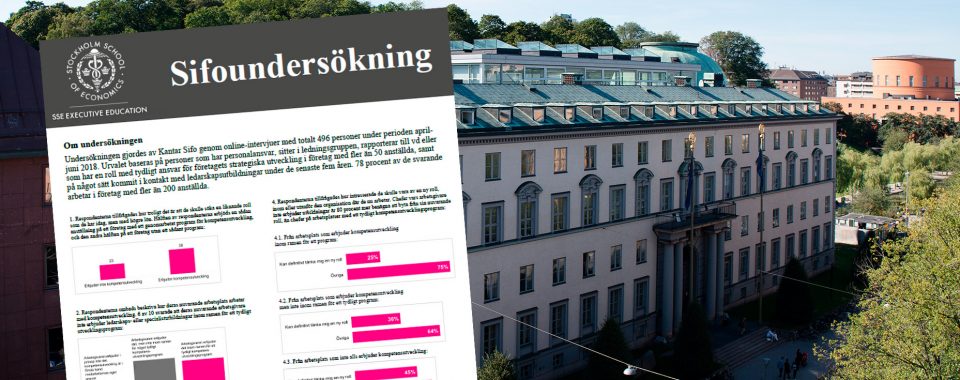
Opportunities to grow attract talent
Companies that offer a well-designed program for professional development have a more than 60 per cent greater chance of attracting talent than other employers. Yet 6 out of 10 companies lack such a program. These are findings of a survey by Kantar Sifo, on behalf of SSE Executive Education, which measured how offering a structured program for training and development affects the attractiveness of an employer.
In the survey, managers at Swedish companies were asked their opinion about two identical employers, whose only difference was that one offered a structured learning and development program while the other did not. A structured program was defined as people with personnel responsibilities or in other leading positions being offered a tailored range of external leadership education and specialist training. The results were clear: employers that offer a program for training and development proved to be in a much better position to attract new talent.
“Companies now invest a great deal in promoting themselves as an attractive employer, but they don’t seem to have really grasped how important opportunities for professional development are in the competition for top talent. There is no doubt that learning and development are, and will continue to be, important components of employer branding,” says Anders Richtnér, CEO of SSE Executive Education.
Of the managers who responded, 66 per cent stated that it is ‘important’ or ‘very important’ that their employer offers a professional development program. 38 per cent feel they would be likely to apply for an attractive role with a new employer that offers a structured program for development. Only 23 per cent state that they would be interested in seeking the same role with an employer that has no such program.
More inclined to change job
In addition, the survey shows that employers offering a professional training and development program are also more likely to retain their employees. Managers who have an employer that does not offer such a program are 80 per cent more inclined to move from their current role than managers at workplaces offering a clear training and development program.
“Today’s jobseekers find themselves in a very different position than they did 5 to 10 years ago. The recruitment process is now just as much about the employer’s attractiveness as it is about the competence and drive of the jobseeker. Although only a minority of companies offer professional training and development programs at the moment, I’m in no doubt that this is set to change,” says Anders Richtnér.
Development is also an investment that pays, since managers at companies that invest in professional development are often considered more competent by their subordinates, according to the survey. In 11 key areas of competence, these managers are seen as more qualified than managers at workplaces without a structured development program.
“These are interesting figures that basically speak for themselves. Managers who have been offered and have attended professional development programs are seen as more competent, which in turn gives them a boost in their leadership role. This is, of course, extremely important for internal confidence and for getting people on board with decisions,” comments Anders Richtnér.
The survey was conducted by Kantar Sifo on behalf of SSE Executive Education over the period April – June 2018 through online interviews with a total of 496 people responding. The sample was based on people who have personnel responsibility, are members of a senior management team, report to a CEO or have a role that includes clear responsibility for strategic development in companies with more than 50 employees, and who have had some sort of contact with leadership education in the past five years. 78 per cent of those who responded work at companies with more than 200 employees.
For more information, please contact:
Anders Richtnér
CEO, SSE Executive Education
Tel: +46 73 659 77 27
Email: anders.richtner@exedsse.se
About SSE Executive Education
SSE Executive Education at the Stockholm School of Economics is Northern Europe’s leading partner for executive education and is ranked number one in the Nordic region within leadership and business development according to the Financial Times. At SSE Executive Education, academic research is integrated with business. SSE Executive Education develops leaders focused on cutting-edge areas, including innovation, entrepreneurship, sustainable growth and financial economics, as well as boosting the competitiveness of companies, organizations and the public sector through powerful transformation.
Photo of Stockholm School of Economics: ©Juliana Wiklund Photography


